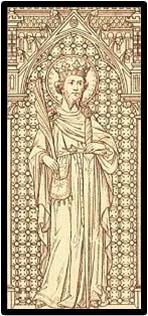MARCH 2 - BLESSED CHARLES THE GOOD

Count Charles of Flanders was called “the good” by the people of his kingdom because he truly was good. He was the son of St. Canute, king of Denmark who was killed when Charles was just five years old. He was raised by his maternal grandfather, Robert de Frison who was then the Count of Flanders.
When Charles grew up, he married a good young woman named Margaret. Charles was a gentle and fair ruler. The people trusted him and his laws. He tried to be a good example for his people to follow.
Some nobles blamed Charles for showing more favor to the poor than the rich. He kindly answered them saying, “It is because I am so aware of the needs of the poor and the pride of the rich.” Everyday, the poor and hungry in his kingdom were fed at his castles.
Charles ordered for plenty of crops to be grown so that the people would have sufficient to eat at prices they could afford. Some rich men tried to store grain to sell later at very high prices. When Charles found out he forced them to sell immediately and at fair prices.
An important man and his sons had been scolded by Charles for their unkind plans to hurt the poor. They felt insulted and joined the little group of enemies who now wanted to kill Charles.
Every morning Charles walked barefoot to Mass, as an act of penance and arrived early at the Church of St. Donatian at Bruges by Borchard. He wanted with all his heart to have a closer and deeper relationship with God. His enemies knew that he walked to church and also that he often prayed alone before Mass.
The people who loved Charles feared for his life. They warned him that his walks to St. Donatian could be dangerous. He replied, “We are always in the middle of dangers, but we belong to God.” One morning in 1127, as he prayed alone before the statue of Mary, his enemies finally managed to kill him.
